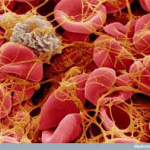Here are the final four exciting developments in science, health and technology of 2017. And, a prediction for what innovation could be truly disruptive in the future.
hemophilia
Scientists report they have successfully treated hemophilia B by giving sufferers gene therapy. When they infuse a gene for the correct blood-clotting factor, it's taken up by the patient who then can produce it on their own. So they no longer have to inject clotting factor to avoid potentially crippling or fatal consequences.
A new study reveals how researchers were able to use a single gene therapy injection in dogs to successfully correct a rare type of hemophilia. Factor VII deficiency is an autosomal recessive bleeding disorder that affects about one in 500,000 people.
Hemophilia is a genetic bleeding disorder. It s X-linked, and therefore it affects males overwhelmingly. There are several different types depending on the factor that s lacking. They have one thing in common: the lack of one of the many proteins clotting factors that are involved with blood clotting makes the sufferer of hemophilia prone to bleeding sometimes fatal bleeding from minor injuries or even no injury at all.

